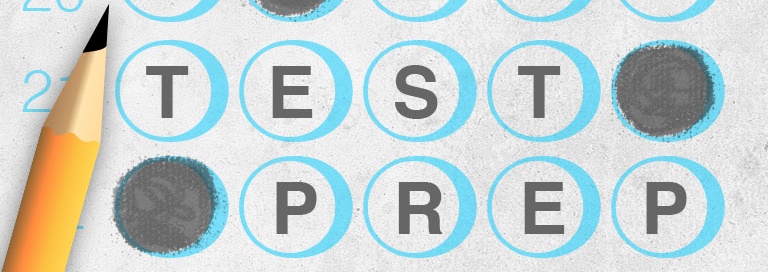I am no sports star—never was—but I do work with a lot of student athletes here at Galin Education. The amount of time and energy students put into athletics amazes me. My students often get up early to go to practice before school and stay afterwards for additional workouts. They train both in season and in the offseason. They stick to their regimens and wake up sore most days. Their dedication is incredible—and their successes prove their effort worthwhile.
Therefore, it may be helpful to some of our student athletes to approach their ACT/SAT preparation the same way they approach their athletic endeavors. Now, I’m not suggesting these students need to workout with common SAT vocabulary words posted around the gym (though that’s an idea…). Instead, I encourage them to apply the same growth mindset they use playing sports to their test preparation.
So below are some truths about ACT/SAT prep that should resonate with student athletes and help them understand how we approach these standardized tests at Galin Education.
(Warning: mixed sports metaphors ahead!)
It Is Critical To Build Your Endurance
The full ACT (including the writing section) takes 3 hours and 35 minutes to complete—longer than the length of an average NFL football game—and that’s without counting the time allotted for breaks. The full SAT is even more arduous at 3 hours and 50 minutes without factoring in breaktime. In plain terms, these tests are long, and students’ ability to maintain their concentration and overall performance plays a major role in their final scores. These tests are marathons and need to be trained for in the same way. That is why Galin Education believes strongly in taking multiple proctored practice tests throughout our training regimen. We want our students to be used to the demands of this test before the score actually counts, so they are prepared to hit it out of the park on test day.
There Will Be Good Days And Bad Days
Two weeks ago, Green Bay Packers backup quarterback Brett Hundley had a horrendous game, throwing 3 interceptions, 0 touchdowns, and posting a tragic 43.6 passer rating, resulting in the Packers getting shut out by the Baltimore Ravens. This past week against the Pittsburgh Steelers, Hundley flipped the script, throwing for 3 touchdowns and 0 interceptions on his way to a 134.3 passer rating. (The Packers still lost the game, mind you, but Hundley was hardly to blame. You’ll have to check out an actual sports blog to get the full details.)
ACT and SAT preparation will similarly have its ups and down. Sometimes a student’s performance has to do with the quality of the opponent; for example, the reading and science section scores can be affected by the student’s prior content knowledge and familiarity. Other times, the student’s head just isn’t in the game. So expect bumps in the road. Like the best athletes, you’ll just have to learn to brush off past mistakes and go out and try your best on the next play.
You Must Deliberately Practice To Get Better
If you have ever watched the pregame routines of famous athletes, you will see them doing some strange things. Basketball great Stephen Curry, for example, can often be seen dribbling two basketballs at the same time before a game. You do not have to be a fan of basketball to know that there is never a time in the actual game where Stephen Curry will have to dribble two basketballs at once. So why does he do it? Because he is deliberately practicing.
Deliberate practice, as defined by Dr. Anders Ericsson, is to do activities specifically designed for gradual improvement in performance. Often, this means practicing in ways that hardly resemble the actual performance task at all, like Stephen Curry who knows that dribbling two basketballs in practice helps him control a single basketball better in the game. Deliberate practice also typically means working specifically on skills you need to improve instead of perfecting skills that are already great. Wilt Chamberlain, at over 7 feet tall, did not have to practice much to learn how to dunk the basketball effectively. However, an infamously terrible free throw shooter, he had to spend a lot of time deliberately practicing his foul shot technique. (He never mastered the free throw, but you should check out Chamberlain’s brief experiment into shooting “granny style” for the full story.) Another example: a student of mine recently told me that his hockey coach made him stay standing while playing goalie for an entire practice because the student was too often falling to his knees before the puck was actually shot. The student let in a lot of goals between his legs that day during practice, but the deliberate practice helped him improved his play for the next game—when it mattered.
At Galin, we often often ask students to do exercises for deliberate practice. I know my students do not have time to color code and fully annotate the reading section during the timed test, but that type of deliberate practice will help students read closely, find answers, and understand texts. Those skills will translate to testing situations.
Your Health Is Important To Your Success
Your brain—like every other part of your body—functions best when in full health. Though I do not feel I need to tell student athletes about the benefits of eating right and keeping active, there is one part of their health they (and many of us in general) often ignore: getting sleep.
Getting an adequate amount of sleep is absolutely critical to achieve peak performance. If you’ve been listening to NPR the last few weeks, you’ve probably heard about Dr. Matthew Walker’s new book Why We Sleep: Unlocking the Power of Sleep and Dreams. In the book, Dr. Walker makes some pretty convincing arguments that sleep is just as important to our daily health and performance as a proper diet and exercise.
Despite Your Individual Task On Test Day, This Is A Team Sport
Though no one else can take the test for you, getting prepared for that moment should be a team sport. Your family, your friends, your teachers, and your Galin Education tutors are all resources and teammates in your training. Be sure to take their expertise, advice, and encouragement to heart. You’re not alone!





